Gardening with Kids: How to Grow Lifelong Gardeners
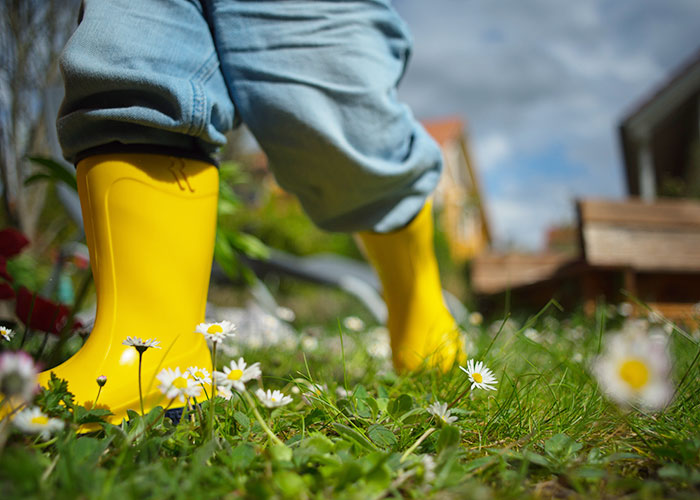 If you are a gardener, or even an aspiring gardener, and you have children in your life, you have a wonderful opportunity to pass along your passion for tending the soil to the next generation. Introducing kids to gardening can inspire a lifelong appreciation for the natural world, not to mention helping kids develop healthy relationships with food, and providing a whole world of learning opportunities.
If you are a gardener, or even an aspiring gardener, and you have children in your life, you have a wonderful opportunity to pass along your passion for tending the soil to the next generation. Introducing kids to gardening can inspire a lifelong appreciation for the natural world, not to mention helping kids develop healthy relationships with food, and providing a whole world of learning opportunities.
But growing young gardeners is a little different from simply growing a garden. You may even find that the goal of engaging kids in the gardening process conflicts with some of your other gardening goals. But if you stick with it, you will reap huge benefits for both yourself and the kids in your life. We hope these tips can help every generation of gardeners enjoy time outdoors together.
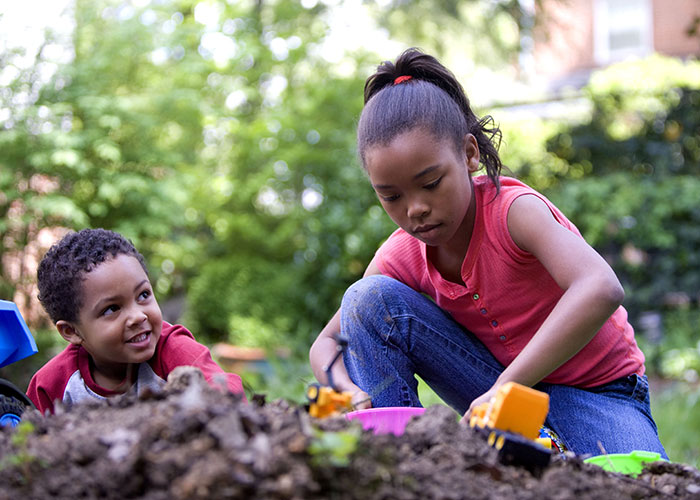 Focus on the Process, Not the Results
Focus on the Process, Not the Results
Bringing children into the garden provides many benefits, but productivity is rarely one of them. At least in the beginning, young gardeners will likely sow more chaos than seeds. This is especially true of toddlers and young children, but even older kids may need a lot of practice before they become effective garden helpers. The key is to adjust your expectations.
Kids are much more likely to engage with gardening if they feel empowered rather than overly limited. You can help by focusing on what they can do rather than what they struggle with, and by keeping the big picture in mind. No matter what vegetables you do or don’t harvest, or which flowers may get accidentally “weeded,” kids are growing so much just from the process of getting their hands in the dirt.
One thing you can do to cut down on your own stress while you wait out the process: give the kids their own areas and age-appropriate tasks. For very young children, that might look like a sandbox or patch of dirt next to your garden beds where they can dig to their heart’s content, or “watering” using a small plastic cup so they can’t drown the plants.
As kids get older and learn more, they can gradually take on more of the “real” gardening tasks. Start with simple, satisfying jobs that can give them a sense of success right away. Transplanting sturdy flower starts, harvesting crops that are fun to pick and fun to eat like strawberries, or sprouting bean seeds between layers of damp paper towels before planting them are all great tasks for kids.
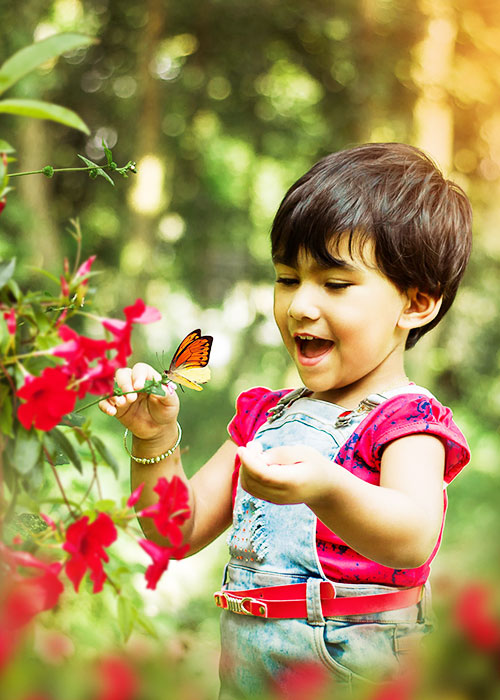
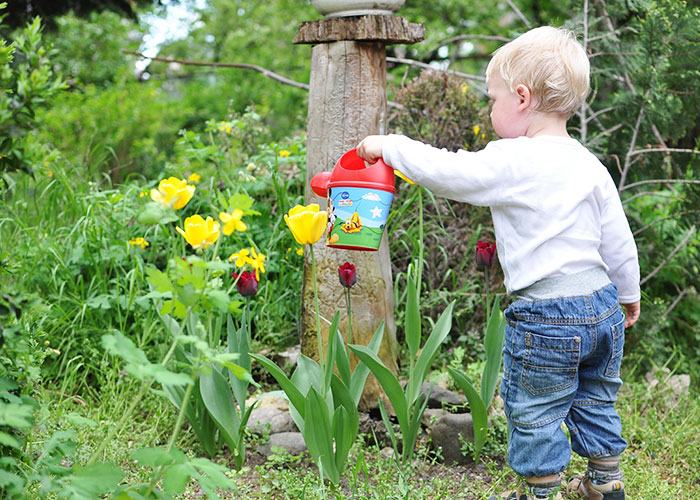 Engage All of Their Senses (Especially Their Sense of Wonder)
Engage All of Their Senses (Especially Their Sense of Wonder)
Kids of all ages, including us grown-up kids, can appreciate the huge range of sensory experiences a garden provides. Think about the mix of colors, textures, scents, and tastes plants will provide. Consider fuzzy lamb’s ears (stachys), bold and bright poppies, tart and tasty sorrel, and candy-scented mint as a few examples. While you’re in the garden, encourage kids to notice everything from the rustling of leaves in the breeze to the squish of recently-watered soil under their feet.
Not only does this help kids engage more fully with the process, it also teaches important gardening skills: grown-up gardeners rely on their senses to make decisions such as watering when our plants look wilted or determining how much compost our soil needs based on how sticky or crumbly it feels.
It isn’t difficult to engage a child’s natural sense of wonder while gardening. From interesting insects to the small miracle of a seedling emerging from the ground, opportunities abound. You can help make the garden even more engaging by creating special places in and near the garden, such as a “fairy ring” of wildflowers, a pole bean hideaway, or places to climb and play.
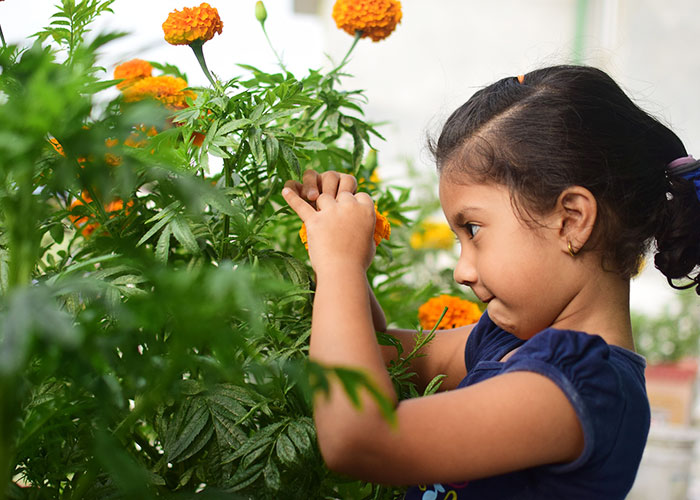
Let Kids Lead
Who doesn’t like to be the boss, at least occasionally? While there are some decisions best left to grownups, you can still listen to kids’ input and incorporate as many of their choices and ideas as possible into their garden space.
Letting kids choose some of their own plants, gardening methods, and garden designs provides awesome learning opportunities and helps kids feel more inspired and empowered. Even if their experiments don’t turn out the way they had hoped, that’s just another opportunity to learn.
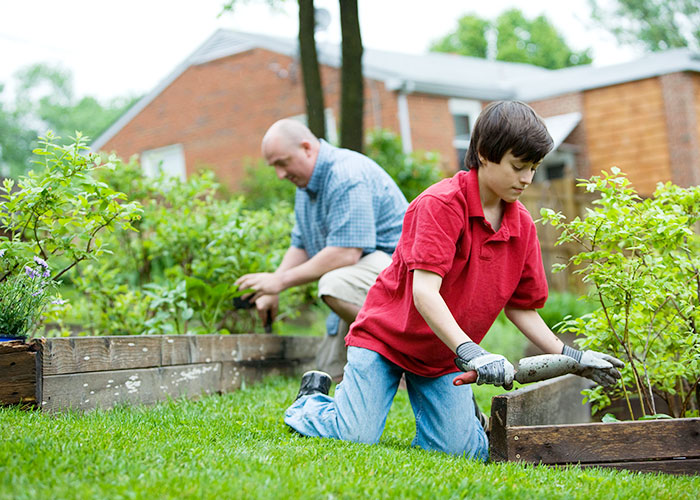 Learn Together
Learn Together
You don’t have to be a gardening expert to grow young gardeners. Even if you’re just getting started yourself, there’s no reason that you can’t invite the kids in your life to learn by your side. And if you have years or decades of experience, chances are that introducing kids to the garden will bring even more opportunities to keep on learning new things each season.
Kids are natural scientists, and they come up with the most insightful questions. Several times in a season, you may find yourself stumped, and that’s awesome! “I don’t know, so let’s look it up together!” is always an excellent answer.
Happy Gardening to you and the kiddos in your life!
